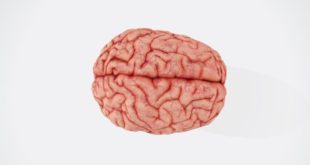In two separate studies, researchers have demonstrated that both the structure of the brain and several memory functions are linked to immune-related genes.

The thickness of the cerebral cortex is correlated with the epigenetic profile of immune-related genes. Image credit: University of Basel.
The body’s immune system has a number of essential functions, such as protection against bacteria and cancer cells.
However, human brain is separated from immune cells in the bloodstream by the so-called blood-brain barrier, which effectively protects the brain from most pathogens and toxins.
Only immune microglial cells reside in the brain, and the blood-brain barrier blocks all other immune cells from entering unless the brain is attacked by viruses or other pathogens.
Until recently, it was thought that brain function was largely unaffected by the peripheral immune system.
However, in the past few years, evidence has accumulated to indicate that the blood’s immune system could in fact have an impact on the brain.
Researchers from the University of Basel, ETH Zurich, Ulm University, Max Planck Institute of Psychiatry, German Center for Neurodegenerative Diseases, University Medical Center Hamburg-Eppendorf, and Universities of Konstanz, Cologne, Bonn and Leipzig, have now carried out two studies that demonstrate that this link between the immune system and brain is more significant than previously believed.
In the first study, reported in the journal Nature Communication, the researchers searched for epigenetic profiles, i.e. regulatory patterns, in the blood of 533 healthy young adults.
In their genome-wide search, the authors identified an epigenetic profile that is strongly correlated with the thickness of the cerebral cortex, in particular in a region of the brain that is important for memory functions.
This finding was replicated in a sample comprising 596 participants. It also showed that it is specifically those genes that are responsible for the regulation of important immune functions in the blood that explain the link between the epigenetic profile and the properties of the brain.
In the second study, published in the journal Nature Human Behaviour, the team studied the genomes of healthy participants who remembered negative images particularly well or particularly poorly.
A variant of the TROVE2 gene, whose role in immunological diseases is currently being investigated, was linked to participants’ ability to remember a particularly high number of negative images, while their general memory remained unaffected.
This variant also led to increased activity in specific regions of the brain that are important for the memory of emotional experiences.
The researchers also discovered that the TROVE2 gene is linked to the strength of traumatic memories.
“Although the precise mechanisms behind the links we discovered still need to be clarified, we hope that this will ultimately lead to new treatment possibilities,” said senior author Professor Andreas Papassotiropoulos, co-director of the University of Basel’s Molecular and Cognitive Neurosciences transfaculty research platform.
“The immune system can be precisely affected by certain medications, and such medications could also have a positive effect on impaired brain functions.”
_____
Virginie Freytag et al. 2017. A peripheral epigenetic signature of immune system genes is linked to neocortical thickness and memory. Nature Communications 8, article number: 15193; doi: 10.1038/ncomms15193
Angela Heck et al. 2017. Exome sequencing of healthy phenotypic extremes links TROVE2 to emotional memory and PTSD. Nature Human Behaviour 1, article number: 0081; doi: 10.1038/s41562-017-0081
This article is based on text provided by the University of Basel.
 #Bizwhiznetwork.com Innovation ΛI |Technology News
#Bizwhiznetwork.com Innovation ΛI |Technology News



